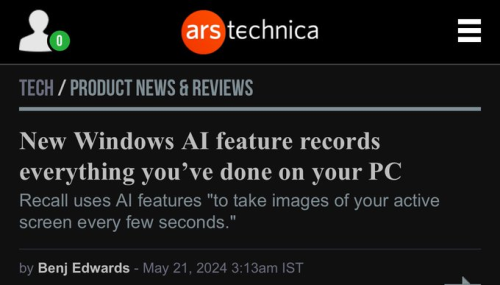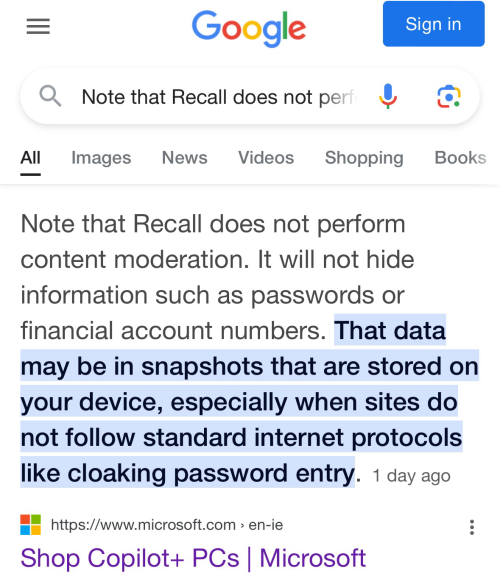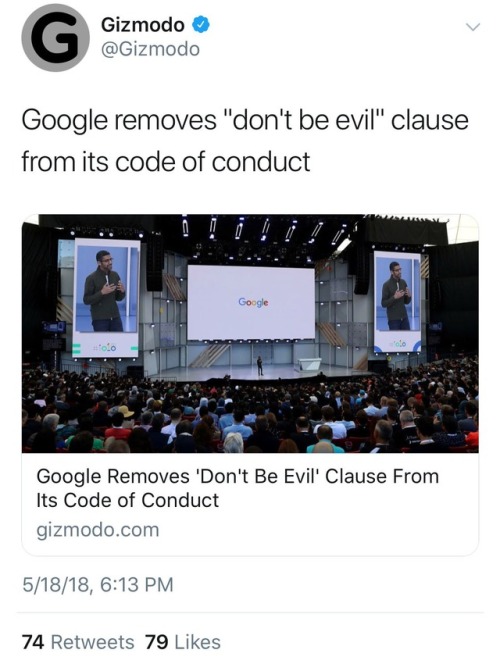Surveillance - Tumblr Posts
District Delegate Eleanor Holmes Norton describes being tracked during her work with SNCC in Mississippi. Contains photo and audio.
Literal definition of spyware:

Also From Microsoft’s own FAQ: "Note that Recall does not perform content moderation. It will not hide information such as passwords or financial account numbers. 🤡

very great coverage of stalkerware use by government workers in australia, im very happy to have worked with crikey to make this reporting possible!


Julia Scher: Surveillance Bed III (1994)

Bitch, I thought you were dead.
I hate this thing.
Though, I can imagine some people would think the answer was to actually surveil, but in secret. Just, no. The answer is not installing a nanny-cam behind a teddy bear and watching your kids secretly. Just don’t surveil (/pretend to) at all. Especially when the other person doesn’t have the power to make you stop.

Hey! He’s watching
Return to office and dying on the job

Denise Prudhomme's bosses at Wells Fargo insisted that the in-person camaraderie of their offices warranted a mandatory return-to-office policy, but when she died at her desk in her Tempe, AZ office, no one noticed for four days.
That was in August. Now, Wells Fargo United has published a statement on her death, one that vibrates with anger at the callously selective surveillance that Wells Fargo inflicts on its workforce:
https://www.reddit.com/r/WellsFargoUnited/comments/1fnp9fa/please_print_and_take_to_your_managersite_leader/
The union points out that Wells Fargo workers are subjected to continuous, fine-grained on-the-job surveillance from a variety of bossware tools that count their keystrokes and create tables of the distancess their mice cross each day:
https://pluralistic.net/2021/02/24/gwb-rumsfeld-monsters/#bossware
Wells Fargo's message to its workforce is, "You can't be trusted," a policy that Wells Fargo doubled down on with its Return to Office mandate. Return to Office is often pitched as a chance to improve teamwork, communication, and human connection with your co-workers, and there's no arguing with the idea that spending some time in person with people can help improve working relationships (I attended a week-long, all-hands, staff retreat for EFF earlier this month and it was fantastic, primarily due to its in-person nature).
But our bosses don't want us back in the office because they enjoy our company, nor because they're so excited about having hired such a swell bunch of folks and can't wait to see how we all get along together. As John Quiggin writes, the biggest reason to force us back to the office is to get a bunch of us to quit:
https://www.theguardian.com/commentisfree/2024/sep/26/in-their-plaintive-call-for-a-return-to-the-office-ceos-reveal-how-little-they-are-needed
As one of Musk's toadies put it in a private message before the Twitter takeover, "Sharpen your blades boys. 2 day a week Office requirement = 20% voluntary departures":
https://techcrunch.com/2022/09/29/elon-musk-texts-discovery-twitter/
The other reason to spy on us is because they don't trust us. Remember all the panic about "quiet quitting" and "no one wants to work"? Bosses' hypothesis was that eking out a bare minimum living on from a couple of small-dollar covid stimulus checks was preferable to working for them for a full paycheck.
Every accusation is a a confession. When your boss tells you that he thinks that you can't be trusted to do a good job without total, constant surveillance, he's really saying, "I only bother to do my CEO job when I'm afraid of getting fired':
https://pluralistic.net/2024/04/19/make-them-afraid/#fear-is-their-mind-killer
As Wells Fargo United notes, Wells Fargo employees like Denise Prudhomme are spied on from the moment they set foot in the building until the moment they clock out (and sometimes the spying continues when you're off the clock):
Wells Fargo monitors our every move and keystroke using remote, electronic technologies—purportedly to evaluate our productivity—and will fire us if we are caught not making enough keystrokes on our computers.
The Arizona Republic coverage notes further that Prudhomme had to log her comings and goings from the Wells Fargo offices with a badge, so Wells Fargo could see that Prudhomme had entered the premises four days before, but hadn't left:
https://www.azcentral.com/story/news/local/tempe-breaking/2024/09/23/wells-fargo-employees-union-responds-death-tempe-woman/75352015007/
Wells Fargo has mandated in-person working, even when that means crossing a state line to be closer to the office. They've created "hub cities" where workers are supposed to turn up. This may sound convivial, but Prudhomme was the only member of her team working out of the Tempe hub, so she was being asked to leave her home, travel long distances, and spend her days in a distant corner of the building where no one ventured for periods of (at least) four days at a time.
Bosses are so convinced that they themselves would goof off if they could that they fixate on forcing employees to spend their days in the office, no matter what the cost. Back in March 2020, Charter CEO Tom Rutledge – then the highest-paid CEO in America – instituted a policy that every back office staffer had to work in person at his call centers. This was the most deadly phase of the pandemic, there was no PPE to speak of, we didn't understand transmission very well, and vaccines didn't exist yet. Charter is a telecommunications company and it was booming as workers across America upgraded their broadband so they could work from home, and the CEO's response was to ban remote work. His customer service centers were superspreading charnel houses:
https://pluralistic.net/2020/03/18/diy-tp/#sociopathy
That Wells Fargo would leave a dead employee at her desk for four days is par for the course for the third-largest commercial bank in America. This is Wells Fargo, remember, the company that forced its low-level bank staff to open two million fake accounts in order to steal from their customers and defraud their shareholders, then fired and blackballed staff who complained:
https://www.npr.org/sections/thetwo-way/2016/09/26/495454165/ex-wells-fargo-employees-sue-allege-they-were-punished-for-not-breaking-law
The executive who ran that swindle got a $125 million bonus:
https://www.nakedcapitalism.com/2016/09/wells-fargo-ceos-teflon-don-act-backfires-at-senate-hearing-i-take-full-responsibility-means-anything-but.html
And the CEO got $200 million:
https://money.cnn.com/2016/09/21/investing/wells-fargo-fired-workers-retaliation-fake-accounts/index.html
It's not like Wells Fargo treats its workers badly but does well by everyone else. Remember, those fake accounts existed as part of a fraud on the company's investors. The company went on to steal $76m from its customers on currency conversions. They also foreclosed on customers who were up to date on their mortgages, seizing and selling off all their possessions. They argued that when bosses pressured tellers into forging customers on fraudulent account-opening paperwork, that those customers had lost their right to sue, since the fraudulent paperwork had a binding arbitration clause. When they finally agreed to pay restitution to their victims, they made the payments opt-in, ensuring that most of the millions of people they stole from would never get their money back.
They stole millions with fraudulent "home warranties." They stole millions from small businesses with fake credit-card fees. They defrauded 800,000 customers through an insurance scam, and stole 25,000 customers' cars with illegal repos. They led the pre-2008 pack on mis-selling deceptive mortgages that blew up and triggered the foreclosure epidemic. They loaned vast sums to Trump, who slashed their taxes, and then they fired 26.000 workers and did a $40.6B stock buyback. They stole 525 homes from mortgage borrowers and blamed it on a "computer glitch":
https://pluralistic.net/2021/09/29/jubilance/#too-big-to-jail
Given all this, two things are obvious: first, if anyone is going to be monitored for crimes, fraud and scams, it should be Wells Fargo, not its workers. Second, Wells Fargo's surveillance system exists solely to terrorize workers, not to help them. As Wells Fargo United writes:
We demand improved safety precautions that are not punitive or cause further stress for employees. The solution is not more monitoring, but ensuring that we are all connected to a supportive work environment instead of warehoused away in a back office.

Tor Books as just published two new, free LITTLE BROTHER stories: VIGILANT, about creepy surveillance in distance education; and SPILL, about oil pipelines and indigenous landback.


If you'd like an essay-formatted version of this post to read or share, here's a link to it on pluralistic.net, my surveillance-free, ad-free, tracker-free blog:
https://pluralistic.net/2024/09/27/sharpen-your-blades-boys/#disciplinary-technology

Overmind
(Original Handmade Book Art Collage: 2 Elements)
Paying FBI agents to spy on people not breaking laws is the same as giving a universal income to the Transient. Except Feds arnt going to go find work.
HYBE Surveillance Content and Self-Monitoring Behavior. Jungkook's Camping Vlog
My initial idea when I decided to write about Jungkook’s vlog was to look it as a mode of self-presentation, given that it’s a travel/journal-vlog. But, after doing some research, I came to the conclusion that I need to dig a little deeper. So, I will use Foucault’s understanding of the panopticon, the concept of synopticon, regular media surveillance and self surveillance which would produce intimate surveillance. I will make a comparative analysis of three types of media contents related to BTS: reality TV with In the Soop, Vlives and Jungkook’s camping vlog. The aim is to try and make sense of how the subject self regulates their behavior and why the audience is attracted to surveilled subjects.
First, I want to briefly talk about ITS. It would seem that we have the perfect example of a panopticon, in which people who are stuck in an environment are subjected to surveillance which ultimately leads to self discipline on part of the individuals because they regulate their own behavior due to knowing that they are being watched. Some scholars argued that reality shows are not really a relevant material to apply the concept of panopticon because the purpose, in order for the show to be entertaining, is that the participants shouldn’t self regulate their behaviors and should act as if the cameras are not there. I think the debate here is more complex, but I’m not going into that. My purpose is to talk about ITS because I think we do have a case of clear self regulating behavior in a situation of surveillance. There are staff in charge of the cameras, on top of motion-activated cameras positioned throughout the space, including the bedrooms, which creates permanent visibility (with the exception of bathrooms). The idea in the panopticon concept is that there is no need to use force, mere observation is enough because eventually it serves its purpose which is constraining the watched subjects.
In one of the papers I read about these concepts, there’s this idea that “in a context of neoliberal theories of surveillance society, citizens have internalized surveillance”. This can be seen in how I personally believe the BTS members behaved throughout the two seasons. They self-monitored mostly in terms of the topic discussed, or more precisely, what they left out. They did that because they knew that this was content for their fans who are accustomed to a certain image. For example, no talks about their personal regular life, despite this being a topic regularly encountered in other Korean shows. This is also connected to their position as idols who are not in a position to share that much to the audience. I would say that one of the few examples (if not the only one) in which there was no self regulating behavior was in Season 1 when Jimin and Jungkook were drunk, played around and eventually broke a mosquito net in one of the rooms, despite the presence of surveillance.


Another concept that I want to use is that of synopticon (Mathiesen, 1987) in which the many watch the few, and not the other way around, and that is because of the mediated environments. This can be applied to ITS as well, because the material is also surveilled by the audience who becomes an active participant by reusing and analyzing the material, what Hybe calls derivative works. This is a concept that is best applied to live streams, which was a major means of communication with the fans for many years and still is, but to a lesser degree currently. In that same paper, the author makes a point about how surveillance takes place through the intimate-self revealing in reality tv, which produces “intimacy surveillance”. A Vlive is a combination of types of surveillances and one of the most fascinating media contents that I’m discussing today. In a Vlive, the subject self-regulates their behavior in the synopticon because millions of people are watching the few, or just one, in most cases. At the same time, there is also regular surveillance made by staff who are not only monitoring the behavior of those who watch the subject (surveillants themselves), but also the actual subject. The outside monitoring became more apparent in the pandemic Vlives. In the old ones, we have a different situation. Despite the all multiple sources monitoring, including the self regulating behavior, the subjects would sometimes have slip ups, because they weren’t capable of completely regulating their behavior because of external factors. One example would be a Vlive from 2016 in Osaka where Taehyung went to Jungkook’s room, without him knowing he would be immediately put in a position of monitoring his self. What we end up seeing is an attempt at trying to regulate his behavior according to what would be appropriate to show and talk about on camera.

The way the diary vlog was created was through a combination of ITS surveillance and intimacy surveillance more typical of a Vlive. We have multiple cameras inside the car, the subject has a handheld camera with himself and he’s also filmed by two other staff members. This is a combination of regular surveillance and self-surveillance. How does this affect the behavior of the subject, in the context of a diary vlog? Jungkook has one way of exercising his power though self-filming, but he’s also in a constant state of self-discipline and surveillance of himself, as this comes from the inside, not the outside, due to the internalized self-regulating behavior because he knows he is going to be watched in the future. The format of the vlog is supposed to create intimacy, as this is its main purpose which they try to achieve in several ways: the other staff who are monitoring are not shown, but their presence is made known because Jungkook talks to them. The subject also addresses his audience – Army – contributing to the illusion of intimacy.
What is the most fascinating aspect of this vlog are the captions added by Jungkook. He tries to present a disciplined image of himself, while at a later date, through the use of captions written by him during editing, he points out the irregularities in the attempt at self discipline, with comments such as “Why are you lying?” “How many times are going to repeat that word?” and so on. The questions that arise here are if by adding the captions, does this mean the subject points out the artificiality and brings into attention the idea that what we see is self-regulated behavior because of its surveillance nature, or do the captions end up being just another part of the self-regulating behavior? Can it be argued that both things are happening, but at different moments in time? Jungkook is automatically moderating his behavior in real time during the time of filming because he is being “watched” (filmed), but he also makes an attempt at further moderating his behavior after he makes the surveillance himself, when he looks at the material in the editing process. He tries to artificially add remarks about what he sees as behavior that needs to be corrected. This is tied to the image he has of himself, which is heighted when he is in charge of dissecting and choosing what he shows to the audience. In a context of constant surveillance from multiple sides, the surveillance made by fans is one of utmost importance.

The last aspect that needs to be discussed is why does the audience have a fascination with surveillance material? It could be because it gives them the illusion of being able to see something private, of comparing their own reality to what they see on the screen. The audience is ultimately a voyeur who gets the chance to “feel” close to the subject they are monitoring in a content based on intimacy surveillance. Jungkook’s vlog is not fascinating due to the camping activities, but because the audience is there to monitor the subject, not the activity. They get another chance to have a glimpse at his behavior, his quirks, the way he talks, the way he looks, even if what he says it’s not that interesting (this also applies to the audience that watches a two hour Vlive of someone just talking, without saying anything that has a clear purpose, a free-flow monologue). The cult of personality is the one that makes the surveillance much more attractive to the audience.
#NoTechForICE

screengrab from the homepage for, and all words verbatim from, No Tech for ICE [dot] com
We are law professors, librarians, attorneys, and law students who are deeply concerned about the role that Thomson Reuters and RELX play in human rights abuses against immigrants. https://notechforice.com/#
sign the petition if you’re able, and please boost
We are law professors, librarians, attorneys, and law students who are deeply concerned about the role that Thomson Reuters (parent company to Westlaw) and RELX plc (parent company to LexisNexis) play in fueling the surveillance, imprisonment, and deportation of hundreds of thousands of immigrants each year. ICE is relying on data supplied by Thomson Reuters and RELX to track and arrest immigrants on a massive scale. What’s more, neither company will say whether lawyers’ research data is being shared with ICE. The extent of your collaboration with ICE—and its devastating impacts on immigrant communities—has been increasingly exposed and was recently highlighted in the New York Times Magazine article “How ICE Picks Its Targets in the Surveillance Age.”[1] We ask that you end the data brokering deals that provide ICE with personal information the agency uses to identify, track, and target immigrants, refugees, and asylum-seekers for arrest and deportation.
Your companies provide large-scale support to ICE’s campaign against immigrant families and communities. Thomson Reuters currently holds six distinct contracts with ICE for a total potential value of $54,399,414.[2] These contracts provide ICE with access to the Thomson Reuters CLEAR platform, Vigilant’s license plate reader database, “data and analyst services,” and “risk mitigation services.” An ACLU investigation found that ICE carries out thousands of license plate searches a month to conduct surveillance on immigrants and their family members. These can be a precursor to the arrests, detention, and deportation of their targets.[3] RELX currently holds contracts with ICE for LexisNexis Accurint subscriptions and computer licenses worth a combined $2,241,878.[4] ICE contracting documents from 2013 describe LexisNexis databases provided through Reed Elsevier as “mission critical” to ICE Enforcement and Removal Operations in leveraging “emerging technology that shares secure law enforcement data between Federal, State and local law enforcement agencies.”[5]
In addition, both Thomson Reuters and LexisNexis have data partnerships with surveillance giant Palantir, the tech backbone of ICE, such that ICE may access data through Palantir independently of these two companies’ ICE contracts.[6] Indeed, Thomson Reuters CLEAR services for ICE are required to be compatible with the analytics program that Palantir developed for ICE, indicating a direct interface between the Thomson Reuters and Palantir software.[7] RELX also has a direct financial stake in Palantir: its subsidiary venture capital firm, REV Venture Partners Limited, was an early investor. As of 2008, the fund owned more than 10% of a class of Palantir shares.[8]
Palantir, which specializes in big data analytics, has already faced significant pushback for providing tracking, profiling, and prediction technologies to military and law enforcement agencies across the country.[9] The company has multiple contracts to provide the tech that allows Immigration and Customs Enforcement (ICE) to identify, track, and target immigrants, refugees, and asylum-seekers for deportation.[10] Recent reports show that Palantir’s case management systems were used in operations to arrest family members and sponsors of unaccompanied children who crossed the border.[11] Palantir’s software was also used in the workplace raids that swept Mississippi in August, the largest immigration raids in a decade.[12] Palantir’s software is routinely used in such raids, including those that targeted 7-11s across New York in 2017.[13] Despite Palantir’s public relations campaign to minimize its role in policing and immigration enforcement, pushback against Palantir is growing.
Given the legal community’s heavy reliance on Thomson Reuters and LexisNexis for legal research tools (Westlaw and Lexis), we are concerned about the ethics of our law schools and workplaces contracting services that enable and profit from digital deportation machinery.[14] Beyond raising professional responsibility red flags, facilitating ICE surveillance violates your codes of corporate responsibility. You are participating in surveillance and deportation practices that culminate in the cruel and unethical treatment of vulnerable populations on an almost unprecedented scale. As law professors and other clients learn about your participation in ICE surveillance, you may lose market share today. More importantly, in the future, your companies will be inextricably linked to ICE’s harmful immigration policies and actions. History will not be kind in characterizing your decision to support the work of ICE.
We, the undersigned legal scholars, practitioners, and students, call on Thomson Reuters and RELX to terminate all contracts with Palantir, ICE, and DHS. The time is now to stop enabling and profiting from the misery being inflicted on immigrant communities by ICE.
[signatures — add your own]
Citations:
1. McKenzie Funk, “How ICE Picks its Targets in the Surveillance Age,” New York Times (October 2, 2019), https://www.nytimes.com/2019/10/02/magazine/ice-surveillance-deportation.html.
2. Thomson Reuters and subsidiary West Publishing Corporation both have contracts with ICE. Active Thomson Reuters contracts with ICE include Award IDs 70CMSD19FR0000116, HSCEMD17F00008 and 70CDCR18P00000017 (through subsidiary West Publishing Corporation) as well as Award IDs 70CMSD19P00000129, 70CMSD18P00000145, 70CMSD19C00000001, HSCEMD16C00002, and 70CDCR18P00000048 (through Thomson Reuters Special Services LLC).
3. Vasudha Talla, “Documents Reveal ICE Using Driver Location Data From Local Police for Deportations,” ACLU of Northern California (March 13, 2019), https://www.aclu.org/blog/immigrants-rights/ice-and-border-patrol-abuses/documents-reveal-ice-using-driver-location-data.
4. Active RELX contracts with ICE include Award IDs 70CDCR19FR0000063 and HSCECR15P00009.
5. Justification for Other than Full and Open Competition, Solicitation No. HSCECR-13-F-00032, https://www.fbo.gov/index?s=opportunity&mode=form&id=4e90a456155db39df108857eb970148d&tab=core&_cview=0.
6. Palantir, Data & Device Partnerships, https://www.palantir.com/partnerships/data-providers/.
7. Limited Source Justification for Solicitation No. HSCEMD-15-Q-00014, https://www.fbo.gov/index.php?s=opportunity&mode=form&id=d434810ca2d525dd29526262f397f66f&tab=core&_cview=0.
8. Securities & Exchange Commission, Palantir Technologies Form D, February 28, 2008, https://www.sec.gov/Archives/edgar/vprr/0804/08042737.pdf
9. Peter Waldman, Lizette Chapman, and Jordan Robertson, “Palantir Knows Everything About You,” Bloomberg Businessweek (April 19, 2018), https://www.bloomberg.com/features/2018-palantir-peter-thiel/.
10. A report commissioned by Mijente, Immigrant Defense Project and National Immigration Project of the NLG to research contracts held by technology companies related to immigration enforcement technologies. “Who’s Behind ICE? The Tech and Data Companies Fueling Deportations,” Empower LLC, Mijente, IDP, NIPNLG (October 2018), p. 31-35, 38, 43-45. https://mijente.net/wp-content/uploads/2018/10/WHO’S-BEHIND-ICE_-The-Tech-and-Data-Companies-Fueling-Deportations_v3-.pdf. Manish Singh, Palantir’s Software Was Used for Deportation,” TechCrunch (May 2019), https://techcrunch.com/2019/05/03/palantirs-software-was-used-for-deportations-documents-show/.
11. Sam Biddle and Ryan Devereaux, “Peter Thiel’s Palantir Was Used To Bust Relatives of Migrant Children, New Documents Show,” The Intercept (May 2, 2019), https://theintercept.com/2019/05/02/peter-thiels-palantir-was-used-to-bust-hundreds-of-relatives-of-migrant-children-new-documents-show/.
12. “Palantir’s technology used in Mississippi raids where 680 were arrested,” Mijente (October 4, 2019), https://mijente.net/2019/10/04/palantirpowersraids/
13. George Joseph, “Data Company Directly Powers Immigration Raids in Workplaces,” WNYC (july 16, 2019), https://www.wnyc.org/story/palantir-directly-powers-ice-workplace-raids-emails-show/
14. Ethical considerations include potential client confidentiality, zealous advocacy, and other professional responsibility issues. Sarah Lamdan, When Westlaw Fuels ICE Surveillance: Legal Ethics in the Era of Big Data Policing, 43 NYU Review of Law and Social Change 255 (2019), https://socialchangenyu.com/review/when-westlaw-fuels-ice-surveillance-legal-ethics-in-the-era-of-big-data-policing/.

1984 (George Orwell)
nandapensa.wordpress.com

1984 by George Orwell


SURVEILLANCE Writer(s): David C. White Producer(s): Matt Reeves Director: Patricia Riggen Studio: 20th Century Fox Television/CBS Television Studios. Logline: A spy thriller about around the head of communications for the NSA, a charming operative who finds her loyalties torn between protecting the government’s secrets and her own. Cast: Sophia Bush, Dennis Haysbert, Catalina Sandino Moreno, Matthew Modine, Allen Leech, Raphael Acloque
I hope this gets picked up as a full series.
what the hell?!
Can they do that???
Lo and behold, Israeli surviellance tech will now be used on you, that's right, YOU USAmericans! And all under Biden's watch, huh?







Newark Living Room

Large, elegant living room photograph in the loft style with a music area, beige walls, no fireplace, and no television.




